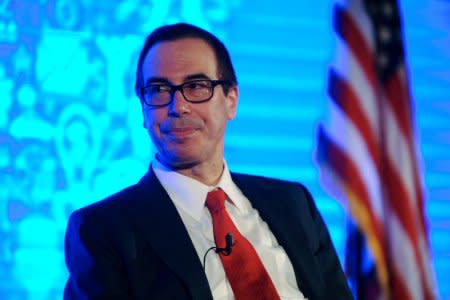U.S. financial council reimagined as boon, not bane, for Wall Street

Thomson Reuters
By Pete Schroeder and Lisa Lambert
WASHINGTON (Reuters) - The Financial Stability Oversight Council (FSOC), which brings together all U.S. financial watchdogs, used to be the scourge of Wall Street but under Treasury Secretary Steven Mnuchin it can serve to ease its regulatory burdens.
President Donald Trump has pledged to roll back legislation he believes stymies economic growth, but opposition in the U.S. Senate makes it hard for Mnuchin to tear up existing rules.
However, he can make it easier for banks to trade, invest and return capital to shareholders by changing how the laws are interpreted and enforced. Created by the 2010 Dodd-Frank reform to better identify emerging threats to the financial system, the council offers Mnuchin as its chairman a forum to hammer out a consensus about how rules are applied.
"FSOC's ability to prod regulators to do something they aren't otherwise doing can be incredibly powerful," said Dennis Kelleher, president and CEO of the Wall Street reform group Better Markets.
Using FSOC as a vehicle to promote deregulation is a volte-face for the council, which under President Barack Obama was a byword for tough financial oversight.
Mnuchin has already used a recent gathering of the council to kickstart an examination of the Volcker rule, which prevents banks from making speculative bets with their own capital.
"He has that forum, and it's clear that he's starting to use it," said Ian Katz, financial policy analyst at research firm Capital Alpha.
Mnuchin has said he supports the Volcker rule in principle, but would seek its clarification.
That in itself can serve to lighten the regulatory burden by reworking the definition of "proprietary trading," or holding banks to a less rigorous standard in terms of proving compliance with it. The five agencies in charge of implementing the rule are all represented on FSOC, providing Mnuchin with a forum to hammer out a common interpretation.
Wall Street has criticized the rule as unworkable, arguing it was impossible for banks to determine when a trade is purely for profit as opposed to creating market liquidity.
A spokeswoman for Treasury declined to comment but pointed to Mnuchin's interview with the Financial Times last month in which he said: “I intend to use FSOC as a very important tool as part of the administration’s policies.”
COMMON INTERPRETATIONS
Mnuchin can also have the Council take another look at rules requiring banks to retain some risk when they securitize loans or get bank regulators to revisit existing capital rules that the industry has long insisted are too restrictive, banking lobbyists say.
The significance of FSOC’s focus will grow once Trump has appointed new heads of the individual agencies. His picks are already in place at the helm of the Securities and Exchange Commission (SEC) and the Commodity Futures Trading Commission, and he is expected to name new bosses for other key bank regulators later this year.
Mnuchin cannot force regulators to change or rewrite rules, but will have ways of cajoling potential dissenters.
For example, all FSOC members are required to sign off on an annual report identifying potential problems facing the financial system. Those who refuse to do it are required to publicly explain their position and so far no one has dissented.
Another, more acute power available to Mnuchin is frequently called "naming and shaming." The Dodd-Frank law gives the FSOC the power to identify a specific threat to the financial system, and direct the primary regulator on that issue to address it.
That regulator then must either enact the FSOC-recommended course of action within 90 days, or explain in writing why it did not. The mechanism, designed to eliminate any blind spots in financial oversight, has only been used once before, to spur the SEC to complete its long-stalled work on money market fund rules in 2013.
In the context of easing rather than tightening regulation, such a strategy could be applied, for example, to rules that can affect market liquidity, which in turn could be deemed a risk.
Past FSOC participants warn that such heavy-handed tactics would only be used sparingly.
"It’s going to be used judiciously. No one really wants to call out another agency," said Nellie Liang, who headed the Federal Reserve's Division of Financial Stability until her retirement in 2016.
(Editing by Carmel Crimmins and Tomasz Janowski)
See Also:

 Yahoo News
Yahoo News 
